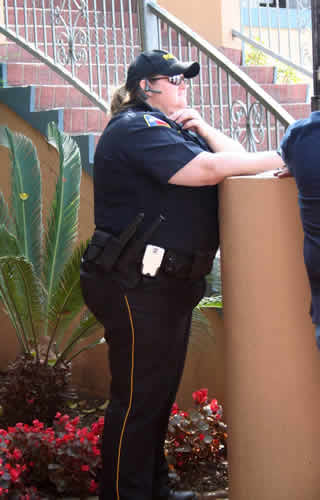A gun is a great leveler. A small, weak, handicapped and/or elderly person can defend themselves against any attacker. Yes well, there are handicaps and there are handicaps. In one of his recent email blasts, Stephen P. Wenger excoriated armchair gun gurus who talk about their warrior spirit—who can’t seem to push themselves away from the dinner table. Wenger’s comment had its intended effect on yours truly, who realized that even the best self-defense firearms training in the world could fall afoul of failed fitness. Put another way, the more fit you are, the more self-defense options you have, the better your overall combat performance. It’s bad enough that civilians gun slingers don’t get it. But cops? I mean, why do police departments allow fat cops? For one thing . . .
It’s expensive. When an overweight cop starts receiving obesity-related health care, the taxpayer pays. I mean more. The taxpayer pays more. For another, fat cops lose respect. Respect is their stock in trade. For another, again, it negatively effects their combat effectiveness.
Don’t think it’s an enormous problem (so to speak)? Click over to fatcop.10-8.org. Or check this officer.com article from police fitness guru Brian Fass:
I can recall a sheriff at one of my lectures who was very concerned about one of his deputies. The sheriff’s particular concern was both and ethical and professional. He told me the story of a Deputy that we will call John. John is a good officer. He has been with the department for over eight years and is very dedicated to upholding the law. John is a family man with a wife and two kids and is an active member his community. Since John joined the sheriff’s department over eight years ago he has steadily gained weight and let his fitness deteriorate. John is well over 325 pounds and is clearly showing difficulty performing the basic functions of this job. Not only has John become a risk to himself and his partners due to his physical limitations but his health has begun to change as well.
John is in his early 30s and is now borderline diabetic and has high blood pressure. On top of that the excess weight coupled with long hours sitting on patrol has caused John to suffer from low back and knee pain. To further complicate the issue, the sheriff and John are from a small county where budgets are very tight in employee turnover is almost non-existent. Having been a member of the sheriff’s department with a clean record, the only tarnish being the inability to pass a basic physical ability test, the sheriff is unsure how to proceed with John’s issue.
Can John be fired due to his inability to safely perform basic tasks of his job? Can John be forced to perform supervised fitness activities and undergo nutritional counseling to bring his fitness back to standards? Should John, as a law enforcement professional, take it upon himself to regain his fitness and wellness? The sheriff even inquired about peer pressure; what if his coworkers tactfully got Jon back in line?
Should police departments routinely test their officers’ fitness levels and remove cops who can’t keep up? Yes. Can they? No. I’ve got one word for you on that score: unions. But you—a civilian gunslinger—can do something about your weight and fitness, espeically in the run-up to holiday excess. Can’t you?





The first 20% of “Bruce Lee’s Fighting Method” is all about physical fitness, not fighting. I don’t look like that cop, but I am definitely not in good enough shape.
Robert, I think you’re laying too much of the blame on unions. For one thing, AFAIK police unions are a big city/midwest/east coast thing. Out here in the Wild West we don’t have police unions outside the big cities and we still have our share of fat cops.
I think the issue here is more one of the culture within the departments and within the community. You won’t see many fat cops in Vail or Aspen, not because of the absence of a union, but because the community – in the form of the chief and the other staff officers – won’t tolerate it. Overweight officers will be told to get in shape or GTFO. OTOH, if the community as a whole is more or less tolerant of being overweight – as many are – you can’t really blame the cops for conforming to the standards of the community.
Also, in small communities, the cost and the time factor of recruiting and training an officer (the process can easily take 6 months and cost thousands of dollars) can make a chief reluctant to discharge an overweight officer, particularly if that officer is a good performer otherwise, or is related to the mayor or someone on the city council.
Comments are closed.